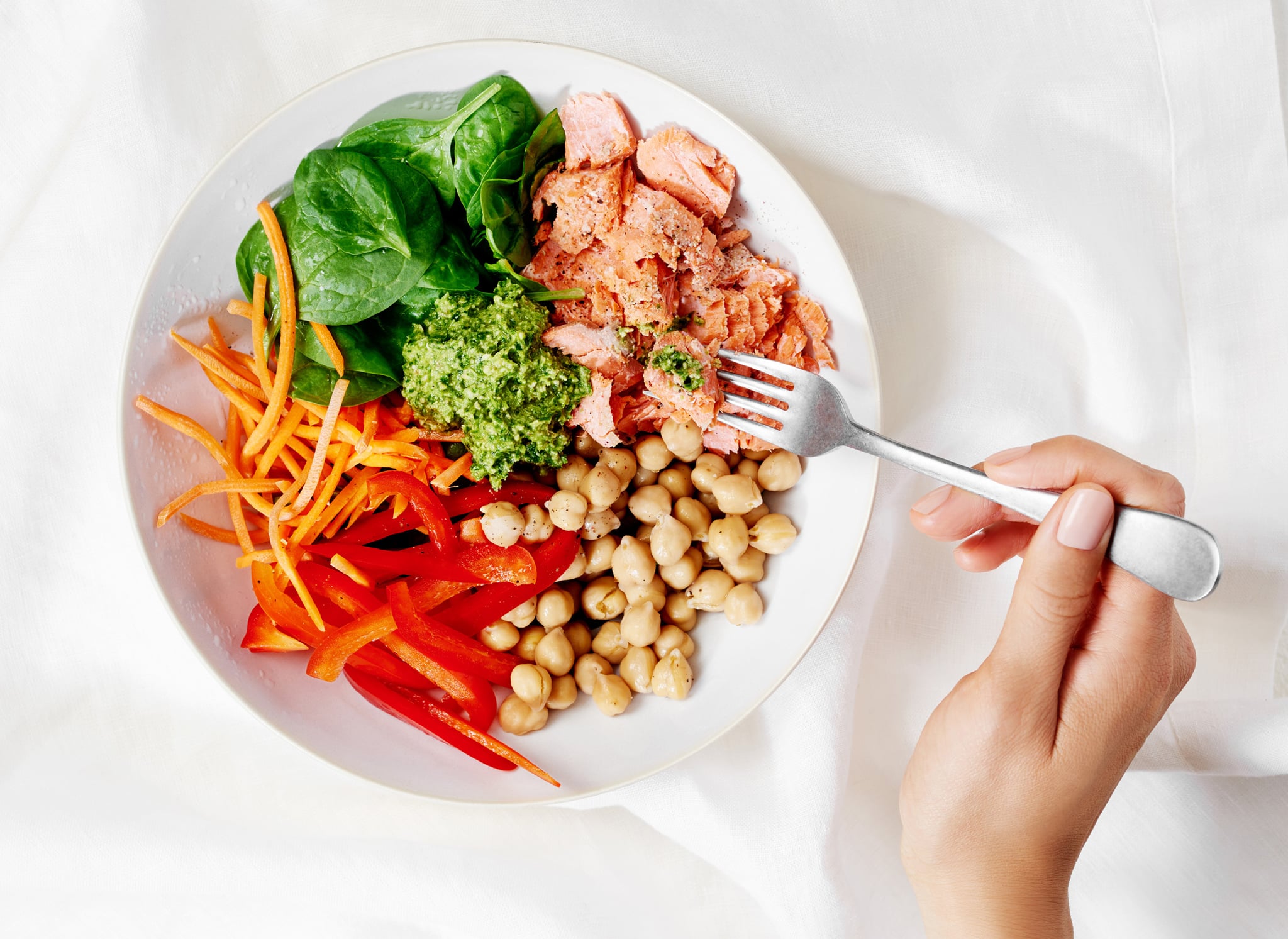Best Weight-Loss Tips
These Are the 6 Best Weight-Loss Tips, According to Experts
There is a lot of weight-loss advice coming from so many different sources, whether you read it in a magazine or hear it on someone's Instagram Story. It's hard to weed out which info is the most effective and the most healthy. Look no further! We've enlisted expert tips from dietitians and fitness trainers, so you can follow this advice knowing it's safe and it'll work.

Don't Diet!
Dieting usually involves overexercising and extreme calorie restriction, which often includes swearing off certain foods. Registered dietitian Leslie Langevin, MS, RD, CD, of Whole Health Nutrition, says "cutting out too much" isn't sustainable. Avoiding foods like sugar, alcohol, and carbs can make you feel so deprived that you won't be able to control those natural cravings, forcing you to overindulge. You'll end up consuming way more calories than you would normally, which can make the scale numbers go up.
Diets don't work, and research shows that 95 percent of people who lose weight on diets will gain it back within one to five years. That's because they are impossible to maintain long-term. What you need to do is find a nourishing, sustainable way of eating that offers you enough calories, nutrients, and energy to live a healthy, happy life, whether that's by eating a plant-based diet, going Mediterranean, or following another nutritious eating plan.
Veggie Up!
Langevin also says one of the best ways to lose weight is to eat more veggies. Include them in every single meal and snack. They're low in calories, which means you can eat tons without gaining weight. Registered dietitians Stephanie Clarke, RD, and Willow Jarosh, RD, of C&J Nutrition, agree and say that veggies are also high in fibre, so they'll satiate your hunger longer, helping you consume fewer daily calories.
Go With Whole Foods
Your diet should be made of healthy, whole foods. Limit the processed carbs, excess sugar and salt, and packaged foods made with artificial ingredients. Eat foods made up of one ingredient like whole grains, fruits, vegetables, nuts, seeds, and lean proteins. Meal prepping can help you stay on track.
It's also important to allow for some treats. Fitness trainer Autumn Calabrese, creator of the 21 Day Fix and 80 Day Obsession, said, "You also need to be consistent with your healthy eating. That doesn't mean you have to be perfect all the time but you do have to be on top of it. I like the 90/10 rule. I know a lot of people say 80/20, but if you're really trying to lose weight then 90 percent of the time you need to be eating healthy, clean food in the proper portions."
Do the Right Kinds of Exercise
While doing tons and tons of steady-state cardio like running straight for an hour will burn calories, it's not the most effective workout for losing weight. Fitness instructor John Kersbergen said, "The most efficient way to get results is to do some form of high-intensity interval training (HIIT) for a total-body workout and to focus on strength training certain body parts (upper body, lower body, core) on different days of the week."
For strength training, bodyweight exercises could be enough — like squats, for example — but adding weights will get results faster. Also, focus on "total-body compound movements that recruit more muscles and burn more calories," such as dumbbell thrusters. You only need to do 45-minute workouts three to four times a week to get results.
Keep Water Close
Drinking tons of water throughout the day not only fills you up, but staying hydrated also boosts your metabolism. No need to chug down a gallon of water a day, but aim for at least 2 to 3 litres a day. If plain water bores you, add lemon or grapefruit slices.
Try Intermittent Fasting
One lifestyle change many experts recommend, especially for people who've tried dieting without success, is intermittent fasting (IF). It's defined as having a period of time when you eat (called your eating window) and a period of time when you don't eat (called your fasting window). There are no rules about what you can eat during your eating window, which is why many people find success — it doesn't feel restrictive like diets do.
There are many different forms of IF, so do your research and find one that makes the most sense for your life and your schedule. One common method is called 16:8, where you fast 16 hours and eat for eight (such as 10 a.m. to 6 p.m.). If that seems too extreme, do 12:12, where you eat from 8 a.m. until 8 p.m.
Aside from this being a sustainable lifestyle, Langevin says the reason IF is so effective is that without having a constant food source, it "gets your body out of 'storage mode' and mobilises fat stores for energy."
Dr. Daryl Gioffre, a celebrity nutritionist and longevity expert who specialises in the alkaline diet, adds that when you fast for 16 hours, "your blood sugar and insulin levels lower," and the human growth hormone increases. He says this increases your metabolic rate ("by up to 14 percent in some people"), and when this happens, your body has no other choice but to start burning your body's stored fat for energy. This is especially effective with stubborn fat like belly fat.








